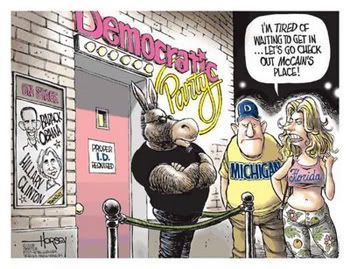I subscribe to a number of our politicians email newsletters. I like to stay informed, and while I understand a lot of what I receive is politics as usual, every once in a while my elected officials surprise me with real analysis and understanding and a different perspective on issues that face us all. Such is the email I received recently from Senator Carl Levin's office.

While the above political cartoon pretty much reflects the current mindset of Michigan and Florida voters, I had understood this issue to be sour grapes on the part of the Clinton Campaign. Afterall, Michigan and Florida had violated the DNC rules, right? They moved their primaries up early without permission of the DNC, and so their delegates weren't supposed to count.
Now while I don't believe any constituency should be disenfranchised, and while I sympathized with the voters of Florida and Michigan as the Democratic primaries in those states were moved up because the Republican controlled legislatures set those dates to accommodate the Republican Primaries in those states, waht I din't know is that New Hampshire moved their primary up as well.
However, as the Op-Ed piece from Senator Carl Levin and DNC Committee Woman Debbie Dingell explains, New Hampshire got a waiver while Howard Dean refused to grant one for Michigan and Florida.
Please read this eye-opening piece published in the March 19, 2008 New York Times:
New York Times Op-Ed on Why Michigan Is Fighting: 03/19/08
By Senator Carl Levin and DNC Member Debbie Dingell
POLITICAL leaders in Michigan and elsewhere have long questioned the stranglehold Iowa and New Hampshire have on the presidential nominating process. In most election years, the candidates seem to spend more time in those two states than in all the others put together. The early states usually pick the party nominees, leaving the large majority of states with little influence in this critical national decision.
This year looks different: we’re seeing one of the most inclusive nominating contests ever, with voters in every state having a real say in the outcome. But 2008 is the exception that proves the rule: the system remains deeply flawed. The story behind the Democratic National Committee’s decision not to seat the Michigan and Florida delegates shows why.
Back in 2004, Michigan Democrats considered taking the Iowa-New Hampshire issue to the party’s national convention, but we agreed instead to the creation of the Commission on Presidential Nomination Timing and Scheduling to examine the process. After a year of study and public hearings, the commission expressed “serious concerns that Iowa and New Hampshire are not fully reflective of the Democratic electorate or the national electorate generally — and therefore do not place Democratic candidates before a representative range of voters in the critical early weeks of the process.”
A crucial change was recommended: that additional states join Iowa and New Hampshire in holding early primaries and caucuses, and that New Hampshire’s primary be the third or fourth contest.
In 2006, the Democratic National Committee adopted a rule providing that four states — Iowa, Nevada, New Hampshire and South Carolina — could hold their presidential primary or caucus in January, with the rest of the states following. The rule dictated that the early states hold their contests in a specific order — with New Hampshire coming third — and no earlier than designated dates between Jan. 14 and Jan. 29.
While Michigan Democrats were disappointed that our state was not selected for one of the four early contests, we appreciated the new rule for adding a bit of much-needed diversity to the early nominating process, and as a first step toward breaking the Iowa-New Hampshire lock. We announced that we would abide by the new calendar provided that other states did the same.
But last August, the New Hampshire secretary of state indicated he was going to schedule his state’s primary before the date specified, clearly defying the sequence and timing the party had set. Michigan Democratic leaders repeatedly asked the Democratic National Committee if it intended to penalize New Hampshire for this violation, but the committee refused to act.
Rather than allow this broken system to persist, we challenged it by deciding to apportion our delegates according to the results of a primary scheduled by the Michigan Legislature for Jan. 15.
The Democratic National Committee proceeded to selectively enforce its calendar rule. It gave New Hampshire a waiver to move from third to second place in the sequence. But Michigan and Florida, which had also moved up the date of its primary, were denied waivers. When Howard Dean, the party chairman, says that states should not be allowed to violate the rules, he ignores the fact that when the committee itself decided not to follow the rules and granted a waiver to New Hampshire, it set the stage for the present impasse.
Under pressure from New Hampshire and the other early states, the Democratic presidential candidates did not campaign in Michigan or Florida. Senator Barack Obama and three other candidates withdrew their names from the Michigan primary ballot. Senator Hillary Clinton and three others did not. The committee has so far refused to seat the Michigan and Florida delegations to the national convention.
Together with other Michigan Democrats, we are working to make sure our state’s voters are not disenfranchised by unfair enforcement of the rules. We are looking for a practical, secure and fair way to redo our primary vote. It is in everyone’s interest that the Michigan and Florida delegates be seated without a convention floor fight. But we are ready to take our strong case to the convention if need be.
We have not endorsed any presidential candidate; we only want to ensure that the Michigan delegates are seated at the convention and that the nominating process is reformed for future elections. Fairness and rationality in our nominating process are far too important to sweep under the rug for yet another election cycle.
_________________
Pretty amazing, isn't it? NOW it's clear that this controversy is not about sour grapes on the part of the Clinton campaign. It's a clear disenfranchisement of Michigan and Florida voters. I agree with Senator Levin. Michigan and Florida have a very strong case to seat their delegates at the Democratic National Convention. And at this point in time, as the Michigan legislature as voted against a do-over on June 3, this issue seems well on the track for a legal solution. So don't be surprised if once again the US Supreme Court is called to action to decide this matter. And guess what? There are at least two justices on the Supreme Court appointed by President Bill Clinton.
It turns out that the wild ride that is the 2008 Election Cycle is far from over.
Thanks for reading.
Technorati Tags:2008 democratic candidates, michigan primary, florida primary, howard dean, carl levin, disenfranchisement
Generated By Technorati Tag Generator















0 comments:
Post a Comment